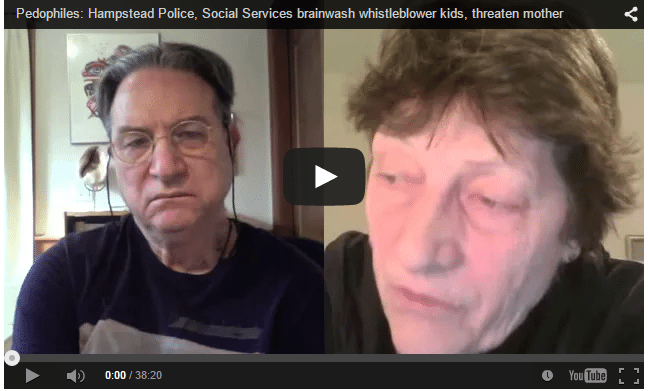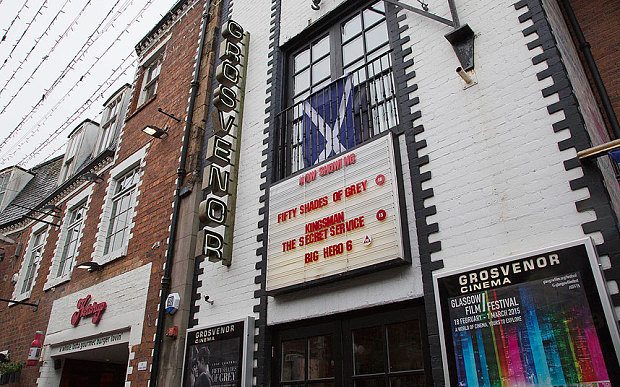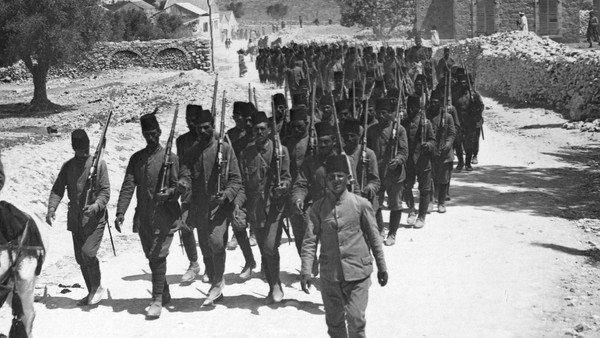 Pedophile Cover-up: Hampstead Police, Social Services, Courts brainwash whistleblower kids, send mother & legal helper into exile, protect Satanist abuser father
Pedophile Cover-up: Hampstead Police, Social Services, Courts brainwash whistleblower kids, send mother & legal helper into exile, protect Satanist abuser father
Here is the video:
VANCOUVER, BC – According to news inside out, in an interview from Germany with Sabine Kurjo McNeil, the “McKenzie Friend”[1] or legal helper to Ella, the mother of two Whistleblower children, Gabriel an 8 year old boy and Alisa his 9 year old sister, whose video documenting a sustained pedophile ritual sexual abuse abuse at the hands of their father and at the Christ Church Primary School they attended in Hampstead UK, NewsInsideOut.com has learned the following developments, evidence of a deep and powerful cover-up of sexual crimes toward children from deep within the UK Police and Social Services structure. NZ Justice Lowell Goddard, newly in charge of the UK Inquiry into Child Sexual Abuse, has been notified of this case and has not responded as of this writing.[2]
- Gabriel and Alisa, the Whistleblower children have been placed in State Social Services care two hours away from London in Kent, UK and after a number of days of sustained brainwashing by representatives of Social Services have been forced to renounce their allegations of ritual sexual abuse by their father and by staff of the Christ Church Primary School they attended in Hampstead UK;
- Ella, the children’s mother suffered an illegal home invasion by 10 police without a warrant. Fortunately, the mother’s barrister was present who demanded a warrant and the illegal home invasion could not proceed. Under threat of immediate arrest by UK police intent on continuing a cover-up of child sexual abuse networks of the father and of widespread sexual abuse at the school, the child’s mother fled into exile in Europe.
- McKenzie Friend legal helper Sabine Kurjo McNeil was forced into exile in Germany after being threatened with malicious prosecution for posting the videos of the Whistleblower children online. It was as a result of the posting of the children’s whistleblowing videos that the attempts by all UK police, social services, school staff and courts to date to cover this matter up have failed, as an international outcry on the Internet and social media has arisen.
- No criminal investigation has been launched against the children’s father, despite the clear testimony of the children and the children’s mother. The father is a reported member of a ritual child abuse and perhaps child sacrifice network.
- No criminal investigation has been launched against the Christ Church Primary School in Hampstead UK despite the children’s clear testimony, and the testimony of other parents, such as the following report from a parent at the school: “everything is completely true i am from the local Hampstead area and my children used to attend christ church primary, they would often come home telling me about weird encounters such as specific kids getting taken out of class by the head mistress katy forsdyke for no apparent, and how the staff touch the kids and manipulate them, I was first approached to join the cult in an after school meeting and when declined I was subtly told that if I told anyone about it then there would be severe consequences on my behalf.
- Vicar: Revd Paul Conrad,10 Cannon Place, London, NW3 1EJ. Tel: 020 7435 6784. Email [email protected], he seems like a lovely guy when you meet him, would never of guessed he holds several secret rooms in the church to carry out untold practices.
- 47 Hollycroft avenue nw3 is the current address of these kids father, i know him personally, he is a very successful and very wealthy man, hence why he has allot of higher member of authorities working with him to brush under the carpet
- Details of school: Christchurch Hill, London NW3 1JH 020 7435 1361, there are several teachers with heavy involvement, but the headteacher is the main instigator of these horrendous acts in school. my child has also told me the school are often setting up any sort of pointless after school class and extra curriculum activity as an excuse to get their hands and do awfull things to these poor children, its only a selected amount of kids undergoing it, because he parents have to be in on it too and the parents who decline get threatened if they tell.









